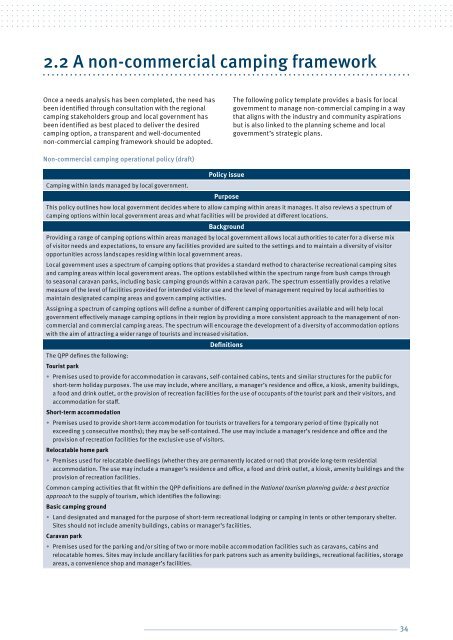qdts-camping-options-toolkit
qdts-camping-options-toolkit
qdts-camping-options-toolkit
You also want an ePaper? Increase the reach of your titles
YUMPU automatically turns print PDFs into web optimized ePapers that Google loves.
2.2 A non-commercial <strong>camping</strong> framework<br />
Once a needs analysis has been completed, the need has<br />
been identified through consultation with the regional<br />
<strong>camping</strong> stakeholders group and local government has<br />
been identified as best placed to deliver the desired<br />
<strong>camping</strong> option, a transparent and well-documented<br />
non-commercial <strong>camping</strong> framework should be adopted.<br />
The following policy template provides a basis for local<br />
government to manage non-commercial <strong>camping</strong> in a way<br />
that aligns with the industry and community aspirations<br />
but is also linked to the planning scheme and local<br />
government’s strategic plans.<br />
Non-commercial <strong>camping</strong> operational policy (draft)<br />
Camping within lands managed by local government.<br />
Policy issue<br />
Purpose<br />
This policy outlines how local government decides where to allow <strong>camping</strong> within areas it manages. It also reviews a spectrum of<br />
<strong>camping</strong> <strong>options</strong> within local government areas and what facilities will be provided at different locations.<br />
Background<br />
Providing a range of <strong>camping</strong> <strong>options</strong> within areas managed by local government allows local authorities to cater for a diverse mix<br />
of visitor needs and expectations, to ensure any facilities provided are suited to the settings and to maintain a diversity of visitor<br />
opportunities across landscapes residing within local government areas.<br />
Local government uses a spectrum of <strong>camping</strong> <strong>options</strong> that provides a standard method to characterise recreational <strong>camping</strong> sites<br />
and <strong>camping</strong> areas within local government areas. The <strong>options</strong> established within the spectrum range from bush camps through<br />
to seasonal caravan parks, including basic <strong>camping</strong> grounds within a caravan park. The spectrum essentially provides a relative<br />
measure of the level of facilities provided for intended visitor use and the level of management required by local authorities to<br />
maintain designated <strong>camping</strong> areas and govern <strong>camping</strong> activities.<br />
Assigning a spectrum of <strong>camping</strong> <strong>options</strong> will define a number of different <strong>camping</strong> opportunities available and will help local<br />
government effectively manage <strong>camping</strong> <strong>options</strong> in their region by providing a more consistent approach to the management of noncommercial<br />
and commercial <strong>camping</strong> areas. The spectrum will encourage the development of a diversity of accommodation <strong>options</strong><br />
with the aim of attracting a wider range of tourists and increased visitation.<br />
The QPP defines the following:<br />
Tourist park<br />
Definitions<br />
• Premises used to provide for accommodation in caravans, self-contained cabins, tents and similar structures for the public for<br />
short-term holiday purposes. The use may include, where ancillary, a manager’s residence and office, a kiosk, amenity buildings,<br />
a food and drink outlet, or the provision of recreation facilities for the use of occupants of the tourist park and their visitors, and<br />
accommodation for staff.<br />
Short-term accommodation<br />
• Premises used to provide short-term accommodation for tourists or travellers for a temporary period of time (typically not<br />
exceeding 3 consecutive months); they may be self-contained. The use may include a manager’s residence and office and the<br />
provision of recreation facilities for the exclusive use of visitors.<br />
Relocatable home park<br />
• Premises used for relocatable dwellings (whether they are permanently located or not) that provide long-term residential<br />
accommodation. The use may include a manager’s residence and office, a food and drink outlet, a kiosk, amenity buildings and the<br />
provision of recreation facilities.<br />
Common <strong>camping</strong> activities that fit within the QPP definitions are defined in the National tourism planning guide: a best practice<br />
approach to the supply of tourism, which identifies the following:<br />
Basic <strong>camping</strong> ground<br />
• Land designated and managed for the purpose of short-term recreational lodging or <strong>camping</strong> in tents or other temporary shelter.<br />
Sites should not include amenity buildings, cabins or manager’s facilities.<br />
Caravan park<br />
• Premises used for the parking and/or siting of two or more mobile accommodation facilities such as caravans, cabins and<br />
relocatable homes. Sites may include ancillary facilities for park patrons such as amenity buildings, recreational facilities, storage<br />
areas, a convenience shop and manager’s facilities.<br />
34


